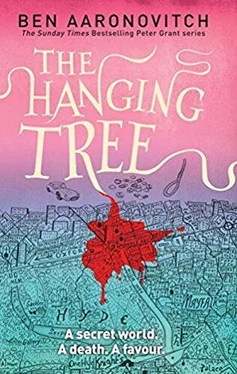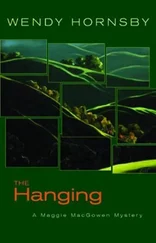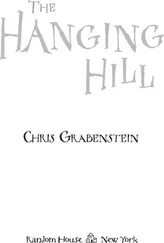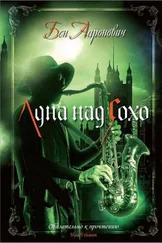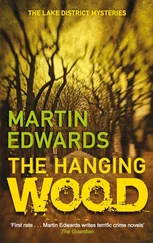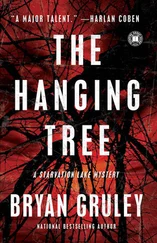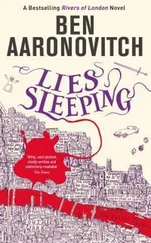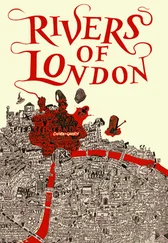I had the Jag’s Airwave set to Belgravia’s channel and Nightingale drove in silence through the grey drizzle as we listened out for screams and lamentations. But these didn’t start until we arrived back to find half a busy Monday night’s customers piling up in the corridor, and the shift duty inspector waiting for us with a dangerous gleam in his eye and a metaphorical rolling pin in his hand. After him was the custody sergeant who pointed out that her duty of care extended to all the prisoners in her cells, thank you. She’d heard the rumours of collapsing houses, burning markets and what really happened at the Saville Row nick a couple of years back. She wanted a pretty comprehensive risk assessment or, failing that, we could take our suspect somewhere else – thank you very much.
We couldn’t take Reynard to the Folly because, never mind that we weren’t PACE compliant, we didn’t even have any cells – although I suppose we could have put him in one of the disused servant’s rooms in the attic. The custody sergeant suggested that Paddington Green, it being where we lock up the terrorist suspects, would be a more suitable location. But Nightingale didn’t agree.
‘A prisoner’s always most vulnerable when he’s being moved,’ he said. ‘And, in any case, if our adversary was truly planning an attack I believe he would have done it by now.’
But I noticed he arranged to spend the shift in the custody suite. Which meant I got sent off to fetch refs, make a formal note of our actions and catch up on the paperwork. David Carey asked if I wanted to go to the pub to celebrate his successful raid which had netted two butcher’s knives, a bag of slightly doubtful skunk and, the reason for the celebration, three thousand quid in used readies that had ‘intent to supply’ written all over them. Beverley was babysitting her sister Brent that evening so a bit of moderate police boozing seemed appropriate . . . right up until FBI Agent Kim Reynolds rang me on her disposable pay as you go.
‘I thought I’d finally take you up on that kebab,’ she said.
It actually took me a couple of seconds to process that. To remember Shepherd’s Bush Market in the snow, Zach having the snot kicked out of him and me knocking Kimberley down with impello because I thought she was reaching for a gun.
Then we’d gone round the corner for a kebab – or at least I did – Kimberley had stuck to Coca Cola despite the fact that the coffee hadn’t actually been that bad.
‘There’s always time for a cheeky kebab,’ I said. ‘When are you going to be hungry?’
‘About an hour,’ she said.
‘Kebab it is then,’ I said, and then popped down to tell Nightingale where I was going.
The Uxbridge Road was full of hunched figures hurrying for the Tube station as I found a rare parking space down a side street and hunched my own way through the irritatingly persistent rain to the other side of the bridge.
It was your classic Kurdish kebab place in that it looked exactly like the Greek kebab places I’d grown up with, only now the meat was guaranteed halal. Just to shake things up, Kimberley had gone for the coffee while I, as a mark of respect to the late Aiden Burghley, had a falafel.
Kimberley had eschewed the mandated FBI agent-in-a-suit look for a pair of off-duty black jeans, an orange and grey sweatshirt with OSU embossed across the front, a blue quilted jacket and, as far as I could tell, no shoulder holster.
‘You stopped dyeing your hair,’ I said.
‘Since I was already knee deep in The X-Files , I gave up trying to hide the colour,’ she said.
‘So the X-Files are real?’
‘You’d love that, wouldn’t you? But I’m sorry to disappoint you,’ she said.
‘What, no UFOs?’
‘Not yet,’ said Kimberley and sipped her coffee with every sign of pleasure. ‘I’ll be sure to let you know if they turn up.’
I asked what had dragged her back across the Pond.
She waved her hand around at the worn Formica and easy-clean plastic interior of the kebab shop.
‘This is all your fault,’ she said.
‘I really don’t think it is,’ I said.
Kimberley begged to differ.
‘After our little adventures underground I was curious,’ she said. ‘It didn’t seem likely that you Brits had a monopoly on . . .’ she hesitated.
‘Magic?’
‘It seemed unlikely,’ she shrugged. ‘That’s the trouble with being law enforcement – you can’t let things go.’
So she dug around and was probably not as subtle as she thought she was, because the next thing she knew she was sitting in her supervisor’s office with a Deputy Assistant Director who’d flown in specially from Washington that very morning just to have a conversation with her.
‘He had my London file open on the desk and looked me in the eye and said “Do you have anything else to add to this report?” And I said I may have, but that I wasn’t sure he was going to like it.’ She grinned. ‘I’m paraphrasing here you understand. He said, “Why don’t you just tell me and I’ll be the judge of that.”’
‘So what did you tell him?’
‘Well I started out small – just testing the waters. A little bit about how you seemed to be able to do some things I wasn’t sure I could explain. He just nodded at me and asked if I’d encountered other instances of magic during my investigation.’
‘And?’
‘I told him everything. About you, Nightingale, Lesley, the Folly – even the people living under the city – didn’t seem to faze him at all.’ She was offered a transfer to Washington within a week.
‘I say offered,’ said Kimberley. ‘It was more ordered .’
To the Office of Partner Engagement, which handles co-operation between the FBI, ‘partner’ agencies and local law enforcement.
‘So is that where they keep the X-Files?’
‘Yeah,’ she leant back on her chair. ‘There’s a big secret warehouse.’
Mostly she worked a regular shift engaging with the FBI’s partners.
‘Whether they wanted to be engaged with or not,’ she said.
The weird shit she was supposed to deal with in her spare time.
‘Like what?’
‘They’ve had me looking into the possibility of demonic possession of active shooters,’ she said. Active shooters being individuals who arm themselves and then pop out to kill as many innocent bystanders as possible. There had been a definite upward trend in both incidents and casualty rates since the turn of the century, and since gun control was off the table the FBI had been looking for other preventative measures. Kimberley had actually found literature on the subject from, of all places, the Centers for Disease Control. They’d commissioned a 1995 study that hinted, very obliquely, that some incidents of mass murder could not be solely attributed to normal criminality or psychological conditions. The study had never been officially released and no follow-up had ever been authorised. So Kimberley had gone on a road trip around the US interviewing all the surviving gunmen that would talk to her.
I thought of Mr Punch and the trail of bloody mayhem he’d left behind him and asked if she had any confirmed cases.
‘That’s hard to say,’ said Kimberley. ‘Half the time the shooter kills himself or is shot dead by first responders. And the rest all have their own sad stories.’ They’d been abused or victimised or they just plain didn’t like the way the world had treated them and had decided to teach it a lesson.
But there had been one interview Kimberley had conducted in Florence, Arizona. A thirty-six year old white male who’d inexplicably woken up one morning, shot his wife and then driven over to his mother-in-law’s house to shoot her, too, and only missed making the FBI’s list of mass killers because he’d been tackled by the postman before he could open up at the local 7-Eleven.
Читать дальше
